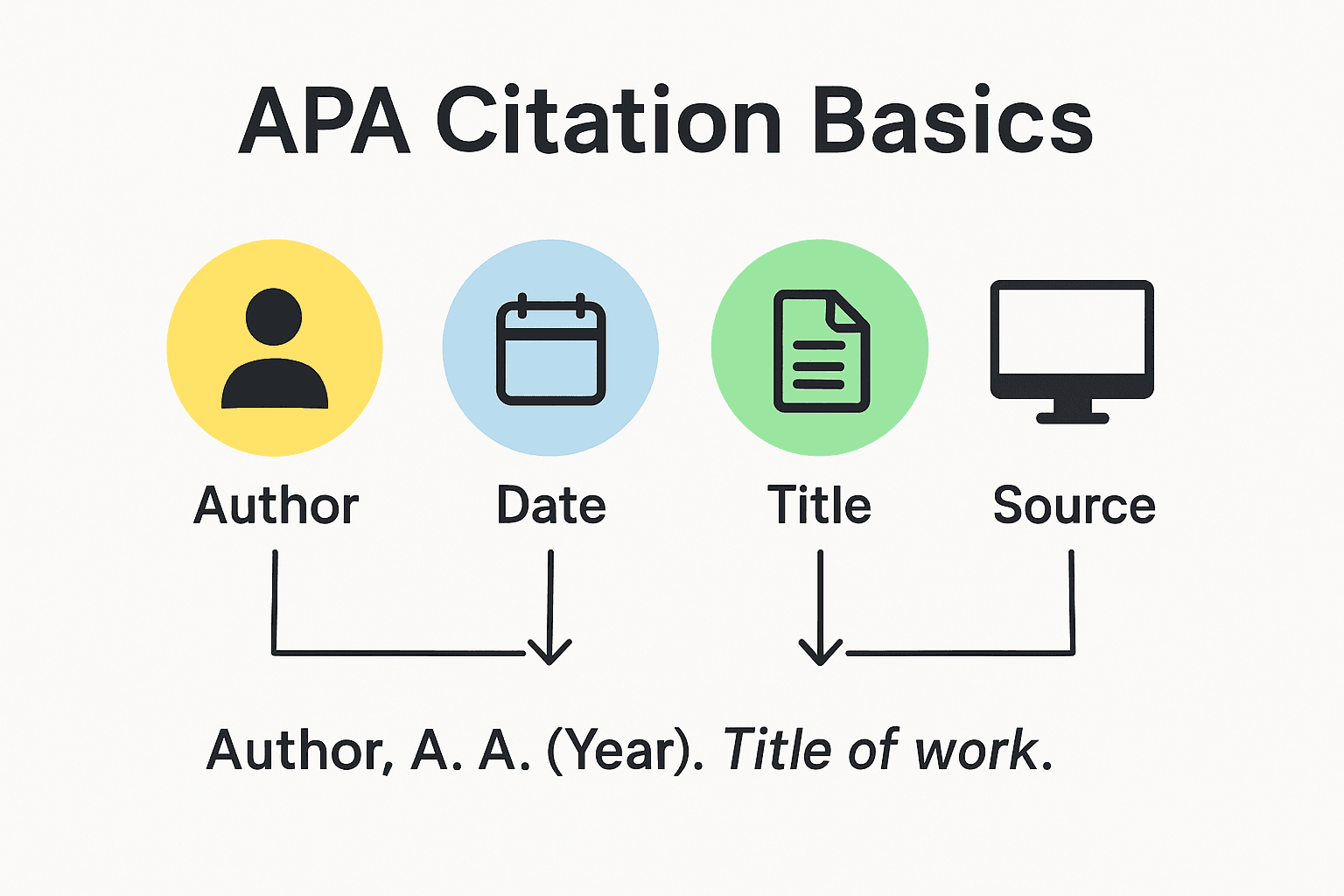Loading...

Struggling with APA citation lists is common, yet few realize just how much precision matters. A single incorrect entry can derail the credibility of your entire paper. Surprised? Most students think APA guidelines are only about alphabetizing or formatting with a hanging indent. Here is what catches almost everyone off guard. Properly managed citation lists are as critical to your academic success as the quality of your research itself. Once you spot the most overlooked mistakes and see how modern tools can reduce errors to nearly zero, you will rethink how you approach every bibliography.
| Takeaway | Explanation |
|---|---|
| APA Citation Lists Ensure Transparency | The APA citation list serves as a roadmap guiding readers through research sources, promoting intellectual integrity by allowing source verification. |
| Core Components Are Essential for Accuracy | Each entry in an APA reference must include author information, publication date, title, and source details to ensure proper attribution and facilitate academic discourse. |
| Precise Formatting Is Crucial | Proper APA formatting, including hanging indents, double spacing, and alphabetical order, is necessary for maintaining scholarly credibility and creating a professional appearance. |
| Avoid Common Pitfalls in Citation | Researchers should double-check for mismatched citations, understand citation quantities, and maintain technical accuracy to prevent errors that compromise work integrity. |
| Leverage Modern Tools for Efficiency | Utilizing digital citation management solutions, online citation generators, and AI-powered tools can streamline the process of creating and managing APA citations, enhancing productivity and accuracy. |
Academic writing demands precision and accountability. The APA citation list serves as a critical roadmap that guides readers through your research sources, ensuring transparency and intellectual integrity. Understanding its fundamental purpose and structure is essential for students and researchers seeking to communicate their work effectively.
An APA reference list is more than a simple collection of sources. According to academic writing experts, it provides a comprehensive blueprint that allows readers to locate and verify every source referenced in your academic work. Each entry answers specific questions about the cited work: who created it, when it was published, what the work is called, and where it can be found.
The list follows a meticulous set of formatting guidelines that create consistency across academic documents. Entries are alphabetized by the last name of the first author, use a hanging indent, and include precise details about publication information. This standardized approach ensures that researchers worldwide can easily interpret and track academic sources.
Creating an accurate APA citation list requires understanding its fundamental components. As research citation guides outline, each reference must include critical elements:
These components work together to create a transparent system of academic attribution. By meticulously documenting each source, researchers enable other scholars to trace intellectual lineages, verify claims, and build upon existing knowledge. The APA citation list is not just a requirement but a fundamental tool of academic discourse that promotes intellectual honesty and collaborative learning.

For those looking to master the nuances of academic citations, our comprehensive guide to academic citations offers in-depth strategies and practical insights to elevate your research documentation skills.
Formatting an APA citation list requires precision and attention to detail. Researchers and students must follow specific guidelines to ensure their reference list meets academic standards and facilitates easy source verification. Understanding these formatting requirements is crucial for maintaining scholarly credibility.
The reference list begins on a separate page at the end of your document. According to APA style guidelines, the page should feature the word "References" centered and bolded at the top. Each entry follows a specific set of formatting rules that create a consistent and professional appearance.
Key formatting requirements include:

Creating a precise APA reference entry involves including specific elements for different source types. Academic writing experts emphasize the importance of including all necessary publication details. The standard format typically includes author name, publication date, title, and source information.
For various source types, the specific details may vary:
Precision is critical. Each element must be formatted exactly as specified in the APA guidelines. Punctuation, capitalization, and spacing all play crucial roles in creating a correct reference entry.
For those seeking to master the nuances of APA citation formatting, our comprehensive APA citation guide provides detailed examples and practical tips to ensure your reference list meets the highest academic standards. Researchers can transform their citation approach from confusing to crystal clear by understanding these fundamental formatting principles.
Academic writing demands meticulous attention to detail, especially when creating APA citations. Even experienced researchers can fall into common citation traps that compromise the integrity of their academic work. Understanding and avoiding these pitfalls is crucial for maintaining scholarly credibility.
Academic writing experts highlight a critical error that plagues many researchers: inconsistencies between in-text citations and the reference list. This mistake occurs when sources cited in the text do not appear in the reference list or when publication details do not match exactly.
To avoid this common pitfall:
Citation practices require a delicate balance. Research on academic writing reveals two extreme errors that researchers frequently encounter: overcitation and undercitation. Overcitation clutters your text and disrupts readability, while undercitation risks academic plagiarism.
Strategies for precise citation:
Technical citation details often trip up even experienced researchers. Citation guidelines emphasize the importance of including precise location information. When quoting or paraphrasing, researchers must provide page numbers, paragraph numbers, or section headings to help readers locate the original source.
Key technical considerations:
For researchers seeking to elevate their citation skills, our comprehensive APA citation guide offers advanced strategies to navigate these common challenges. By understanding and implementing these best practices, you can transform potential citation pitfalls into opportunities for scholarly excellence.
Navigating the complex world of academic citations requires strategic approaches and intelligent tools. Researchers and students can dramatically improve their citation management by leveraging modern technological solutions and implementing smart organizational strategies. Understanding the right tools and techniques can transform the often challenging process of creating an APA reference list.
Academic technology experts recommend using specialized reference management software to streamline citation processes. These digital tools offer comprehensive solutions for tracking, formatting, and organizing research sources with remarkable precision.
Key features of advanced citation management tools include:
Research productivity platforms have revolutionized how researchers create citations. Free online tools now provide instant, accurate APA citations by simply entering a URL, ISBN, or research identifier. These generators eliminate manual formatting errors and save significant time in the research process.
Strategies for effective online citation generation:
Technological innovation research highlights the emerging role of artificial intelligence in citation management. AI-driven tools now offer sophisticated features that go beyond simple formatting, providing intelligent source tracking and sophisticated research assistance.
Advanced AI citation tools can:
For researchers seeking to elevate their citation skills, our comprehensive APA citation guide offers cutting-edge strategies and insights into modern citation management. By combining technological tools with scholarly precision, you can transform your research documentation approach and achieve academic excellence.
The APA citation list serves as a roadmap that guides readers through your research sources, promoting transparency and allowing verification of the referenced materials.
An effective APA reference list must include the author's name, publication date, title of the work, and source details, ensuring proper attribution and facilitating academic discourse.
Your APA citation list should begin on a new page, include the word 'References' centered at the top, follow a hanging indent format, be double-spaced, and be arranged alphabetically by the author's last name.
Common mistakes include mismatched in-text citations and reference entries, overcitation or undercitation, and technical formatting errors such as incorrect page numbers and inconsistent formatting.
You have seen how a single citation error can put your entire paper’s credibility at risk. The stress of mismatched reference details, confusing formatting, or manually tracking sources can leave anyone feeling defeated. Why risk these common mistakes – especially when you can let proven technology take over?

Make every research paper bulletproof starting today. Head to Samwell.ai and unlock an AI-powered platform built for fast, error-free APA citation lists. Our smart tools handle everything from double-checking author names to ensuring each reference is perfectly formatted. Experience how over one million students and academics already streamline citations using our advanced writing solutions. Start your perfectly formatted paper now and never let another reference slip through the cracks.



